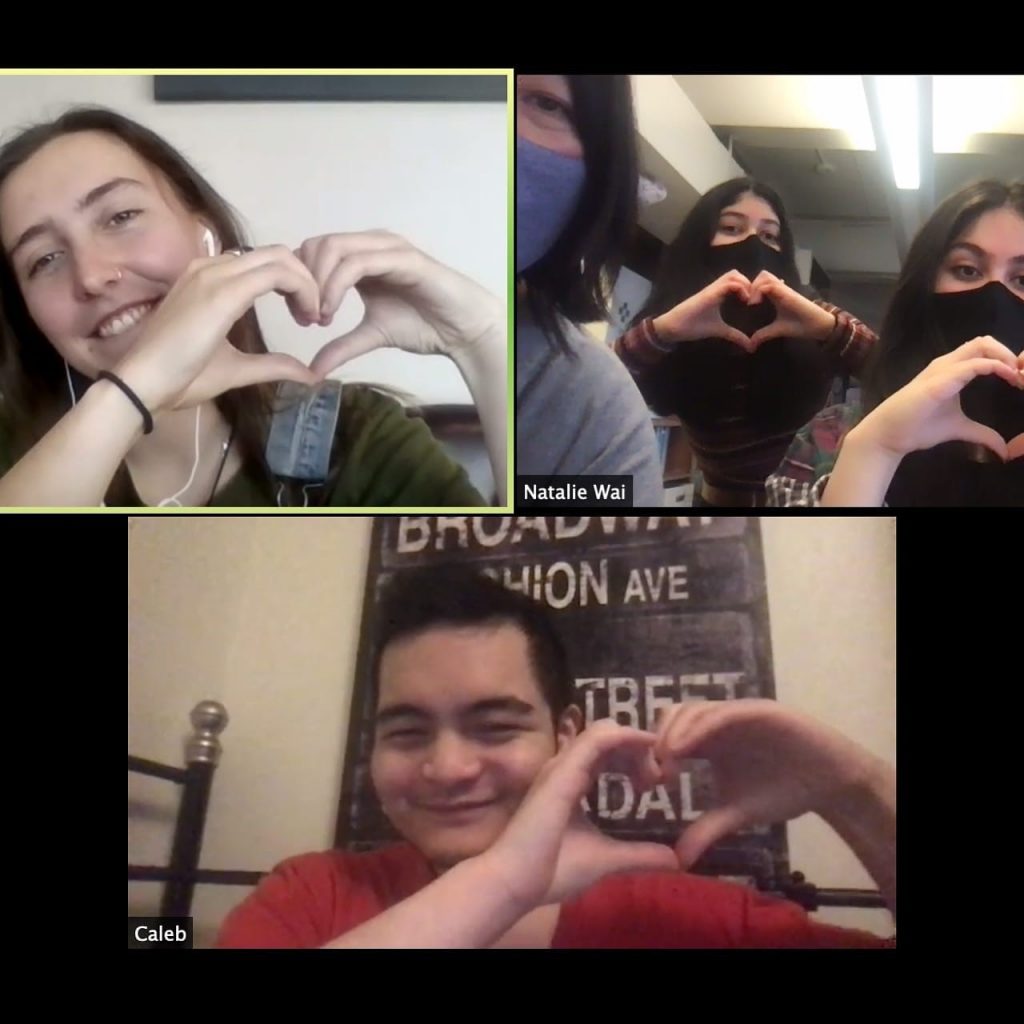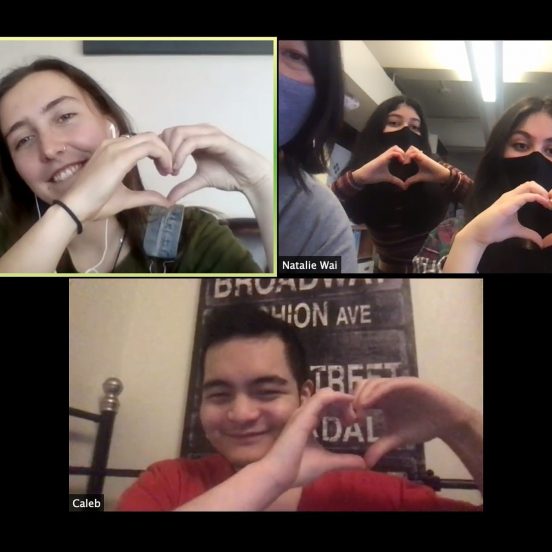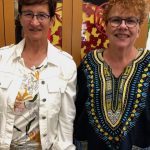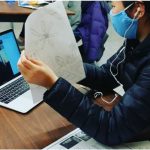An interview with Annie Montague (Frontier College), Emily Sullivan and Simen Hennum (Rise) by Alison Taylor
Alison: When you think about the Britannia Homework Club, what images come to mind?
Annie: Being located in Britannia has grounded our sense of place in community since the early 1990s. The BC office of Frontier College is nestled into the community education wing of Britannia Secondary. Each day students, faculty, staff, community members, parents, engineers, and visitors dart and weave through the hallways in and out of rooms; the sounds and movement of the day are only briefly interrupted by moments of silence when class is in session. Even then, the sound of Tik Tok videos, shouts, and intercom announcements often filter in through our doors. Each night after the school day is done, there is still light and activity pouring out of the Homework Club room as we leave the building; laughter and chatter lighting up the evening.
Emily: When thinking about Britannia Homework Club, I think about what I considered the highlight of my entire week back in undergrad. After stressful days over at UBC, the other tutors and I considered Britannia Homework Club a sort of oasis away from the bubble that UBC campus can be. Walking into Homework Club, you are immediately surrounded by energetic high schoolers excited to tell you all about their day, or show you a new song they’ve been playing over and over. Laughter is never lacking in that classroom, and the hallways fill with the smell of whatever pasta we’re serving for dinner. For a few hours we’re in a completely different world, where you’re not just being a tutor, you’re being a friend.
Alison: How did the partnership with Britannia and Rise come about?
Annie: For over a decade we’ve been collaborating with passionate faculty members at Britannia who organize the homework club. Recruiting and training volunteers can be a laborious and administrative-heavy task that many community partners don’t have the time or capacity to independently manage. Frontier College’s role has responded to this need by inviting university students, adult professionals, retirees, community members – you name it – to participate as tutors in various community education initiatives in the Lower Mainland. Tutors undergo a thorough screening process (application, interview, reference checks, criminal background checks); training in student-centred individualized learning philosophy, anti-oppression and inclusive approaches to education; and relationship building strategies before being matched with learners out in the community.
In 2018 we began partnering with Rise Tutoring through Kite Vancouver; a UBC student volunteer group that formed in order to connect UBC students with meaningful tutor opportunities outside of the university. This group has played a key role in finding a larger group of keen and socially conscious tutors.
Emily: My sister (Laura) and I had wanted to create a volunteer tutor program for a while, with both of us having done private tutoring for kids in more affluent areas of Vancouver. After much research and many, many, calls, Laura reached Kim and Robin, who formerly ran Britannia Homework Club. Laura was amazed to hear that Britannia Homework Club was in desperate need of more tutors, even with all of the tutors that Frontier College was providing. After that call, we put the rest into hyper-speed to get tutors for Homework Club as quickly as possible.
Alison: What kind of ‘behind the scenes’ work is required for this kind of partnership?
Annie: In addition to the logistical side of onboarding and training volunteers, Britannia Faculty, Rise Coordinators and I meet on a regular basis to discuss what is working, what needs improvement, and what support is needed (and from whom). Running the Homework Club is an ongoing and evolving process that requires the ability to pivot and be flexible to the shifting needs of students. Britannia faculty provide input into what skills tutors should have coming into their roles, based on their intimate relationships with the students, which we then work into our training sessions. For example, Natalie and Katie let us know that some of the tutors were having a hard time approaching students and forming rapport. During our next tutor training, we focused specifically on tactics to “break the ice” and become more comfortable with students. Then, Rise coordinators were able to follow-up with tutors 1:1 to support them in-person. Continuous group effort is required to meet the needs of the Britannia students in each program.
Simen: Ensuring that a steady consistent stream of tutors arrive at Britannia (either in-person or on Zoom) requires a ton of additional work behind the scenes. A Rise volunteer coordinator oversees each homework club session and is in charge of scheduling and tracking volunteer hours, and/or matching students and learners 1:1 if it is online. Many incoming university students already have some tutoring experience, but for those with little to no prior experience, the training provided by Frontier College has proved crucial. Without the appropriate skill set, we would not be able to meet the shifting needs of students. While centering the students at Britannia, we also hope to provide an enjoyable experience for tutors. After every session, one of the coordinators usually does a short, informal debrief with the tutors as we commute back to our respective homes, making sure that everyone has the opportunity to share their experiences so that we can improve and learn together. Good communication between tutors, Frontier College, and the Homework Club staff ensure that everyone has an enjoyable experience. Prior to the pandemic, we had the chance to stop by Annie’s office right by the Homework Club to share either logistical updates or simply just to chat. While we have been able to replicate this over email, these more or less spontaneous, informal encounters have been the most helpful for the running of the program.
Alison: Why is it important to have a shared philosophical approach to the work?
Annie: Approaching our work from an asset-based community development model of engagement, we aim to draw together strengths and build relationships to create more holistic community support. As a community school, Britannia is a community hub in a dynamic, historied neighbourhood stratified by systemic socio-economic factors. The diverse student population at Britannia reflects this context. Alleviating some of the strain for students caused by systemic barriers requires everyone bringing something to the table.
The Britannia HW Club is a great example of how this can be done. Katie, Natalie (Britannia Faculty), the Rise Team, and Frontier College all understand the importance of meeting students’ individual needs and providing unique one-to-one support after school hours, putting the student at the centre of all our efforts. We all approach our work with the Homework Club as valuing and mobilizing each other’s (and the greater community’s) strengths. Having a shared philosophical approach provides important grounding for our actions.
Simen: As Annie writes, we strive to put the individual student at the center of the work that we do, while at the same time being attentive to the structural inequalities of the Canadian education system. As university students, our role involves tutoring students in a way that meets their learning needs. While we don’t take on the role of teachers, we do hope to provide a similar service to private tutoring companies – except ours is free! We make every effort to bring to the table a group of university students and community members that consistently show up, see the individual student, and tutor a subject in a way that works for the learners. Thanks to our partnership with Britannia and Frontier College, and their expertise, we are able to identify what those needs are, and to be empowered with the tools to try to meet those needs. Our shared philosophical approach to the work informs the way we go about doing this.
Alison: What are some of the challenges of community engaged work during Covid?
Annie: From my perspective, the greatest challenge during Covid has been communication with learners due to the barrier of inequity of access to WiFi and software/hardware. (This has proven true for the majority of community partners with whom Frontier College works, not only Britannia HW Club.) Many students and families rely on public spaces or schools for free and reliable connectivity; when the pandemic began and social-gathering changed, this also changed the learning landscape drastically. Even if community partners could support students online, there was no guarantee that students were set up at home to receive the support.
The Britannia HW Club has been an example of big change and big success during Covid, and one I talk about often. Natalie and Katie, who were authorized to physically be in the building with the students, did the hard work of advertising the HW Club in its ‘new’ form this year, and worked to procure laptops with Zoom and internet access for the students to use for HW Club.
The Rise team had the organizational expertise to organize Zoom session meetings for individual students each afternoon. I was able to move our regular long in-person tutor training session online, and gathered forms and record checks via email. Through the first few months of the school year, Katie, Natalie, Rise and Frontier College met regularly online to trouble-shoot and touch base. Slowly a rhythm developed, and students, tutors, faculty, and community partners had more balanced expectations. We never would have guessed that during the first year of Covid schooling that we would have such strong participation:
- 96 students
- 40 volunteers
- 258 volunteer hours

Emily: As Annie mentions, technological barriers became very quickly apparent when we first attempted online tutoring during COVID. Even with new laptops for use at HW Club, we still had connectivity issues for much of the past academic year. These improved with troubleshooting as the year went on, and we are incredibly grateful to Katie and Natalie for solving problems on their end.
The other main issue we had this year was getting more high school students online for tutoring. Before COVID, we sometimes had days with over 70 kids at a time in Homework Club. But now, the only way to do tutoring was in an online, more formal, one-on-one setting. This really removed the mentoring aspect of Homework Club, which is what so many of the kids come for in the first place. During COVID, we had some days where we didn’t see any students wanting tutoring at all. We couldn’t blame them – Zoom fatigue is something that all of us have dealt with this year, especially with all of our university courses being 100% online. This was a problem that we had no possible way to fix, which makes us very excited to return to in-person tutoring (hopefully in September!).
Alison: What kind of informal learning is possible for all the partners?
Annie: I have learned a great deal about how impactful a project/program can be if you have the right components – and strong communication – to support it. I feel like each member of the ‘team’ at Britannia HW Club acts as a specific puzzle piece and we all complement each other to create a whole image. I am constantly in awe of the hard work of the Britannia Faculty and the Rise team; I continue to learn a great deal from them. While roles and responsibilities may fluctuate during any given point in a year, I feel we have developed strong relationships to support each other’s needs during the process of collaboration.
Simen: From my experience, the university students that attend Homework Club learn as much during a tutoring session as the students at Britannia do. Many tutors are aspiring teachers and find it to be a great way to learn more about the profession, while also getting to know the students. During the span of a session, as much time is spent getting to know each other as doing homework. I have personally learned how to play chess from one of the students! But more importantly, university students, many of whom are new to the city, have the chance to grow stronger connections to people and the greater community outside of the university. This type of informal learning can only happen outside the classroom and is a great addition not only to a university student’s degree, but more generally to our lives as members of the community.
Alison: What should others consider when making this kind of commitment, individually or organizationally?
Annie: Others interested in community/university partnerships should have a shared vision and understanding of the most important part of the project/goal. Asking critical questions (i.e. Why are we doing this? Who is actually benefiting? Is what we are doing actually needed by the community?) and showing up with a willingness for continued reflexivity, an openness to communicate in various styles/ways and ability to adjust those tactics as needed, a realistic understanding of everyone’s capacity to contribute, and humility to go with the flow of what direction the endeavour takes.
Simen: I want to echo Annie’s sentiment about the importance of reflexivity and humility. For others interested in working on projects like these, asking themselves which actors in the community are already doing similar work, and how one’s capabilities and resources can potentially complement what is already being worked on, is important. And on an individual level, having the spare time to commit to volunteer for projects like these is a privilege – which we as tutors keep in mind as we approach our work.
We at Rise Tutoring feel very lucky to be able to work with and learn from the staff at the Britannia Homework Club and Frontier College and know that our strength as a team derives precisely from our shared understanding and commitment to the work we are doing.

Annie Emily Simen





